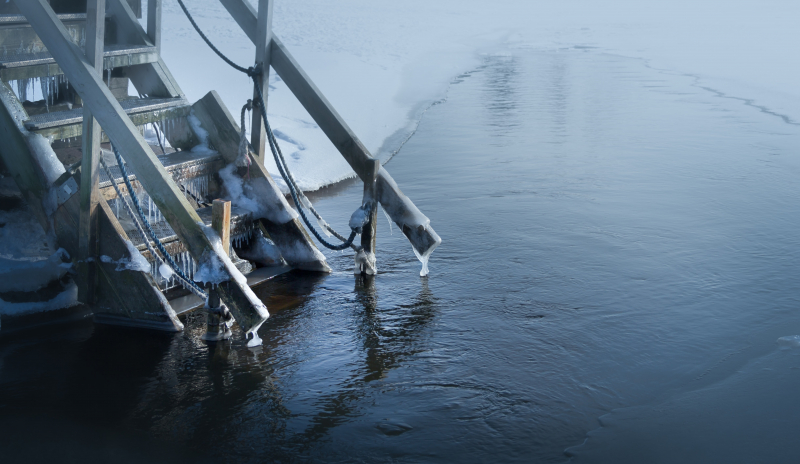While it is officially a secular state, Russia still holds onto many of its religious rites, and celebrating Epiphany (Krescheniye, or Baptism Day) is one such custom. In case you’re not familiar with Eastern Christian traditions, it is a common belief that on January 19, the day when Christ was baptised, all water becomes holy, and dipping into a natural spring can wash away one’s sins and even cure illnesses. It just so occurs that in winter, most Russian rivers and lakes are frozen; yet, what’s a thick layer of ice to someone who wants to partake in a miracle?
Apparently, the tradition of bathing in ice holes dates back to as early as 1525. During the Czarist times, it was both an important court ceremony and a folk custom, associated with different rituals and superstitions; prior to bathing, people took part in a special procession, and the crucifix-shaped ice hole, called Iordan, was usually sanctified by a priest. Strangely enough, murky weather on this day was considered a good omen, and a sunny day forecasted a draught.
As tough as it sounds, the custom remained even into the Soviet times, though having lost its religious context. The practice was (and still is) called morzhevanie, and those who partook in it were called “Morzhi” (Russian for “Walruses”); ice swimming was considered a great way to “temper” one’s body against cold and illnesses. Can’t say that I’ve ever tried it, but I always envied the ability of those who lounge around thinly clad in the middle of February.
What is even more amusing is that after the 1990s, the custom has not just regained its former religious significance, but enjoyed exceeding popularity even in comparison with the times when Russia was still an Orthodox state. Once a ritual of provincial peasants and religious figures, it has made its way to city dwellers and beyond, having become a tradition enjoyed by religious and non-religious Russians alike. Personally, I was impressed to learn that even some members of ITMO's team partake in the custom. Evgenii Raskin, the head of ITMO’s Department of Youth Policy, has been doing it for several years now:
“This will be the eighth year in a row that I partake in Epiphany’s bathing. You see, January 19th is my birthday, so that has become a great tradition for me. I tend to bathe in St. Petersburg, although in 2012 I did it in Khabarovsk, and last year it was in Sochi. With each year, more and more of my friends join me, and, since last year, it’s already two of us who celebrate their birthdays on this day. I advise everyone to take part in this most extreme event: it’s a really thrilling experience, and none of us ever got ill!”
As weird as it may sound, dousing and ice swimming are indeed long-standing medical practices. Marathon runner Paula Radcliffe, for instance, attributed her victory in the European Championship to it. Actually, there are all kinds of different events dedicated to ice swimming throughout the world. In US and Canada, for instance, the so-called Polar Bear Plunges are used to raise money for charity and are sometimes part of New Year’s celebrations; a similar event serves as a rite of passage for scientists and visitors of the Scott Polar Research Base in Antarctica.
So the next time you see a group of people gathered around an ice hole, do not worry: it’s a centuries-old traditional event that mostly has to do with new beginnings and leading a healthy lifestyle. And, if you’re interested in seeing the ceremony, note that in St. Petersburg, it is traditionally held on January 19 at the beach of the Peter and Paul Fortress.
As for trying Epiphany bathing yourself, there are certainly several things that you should consider. There are many health risks associated with ice swimming, and it is definitely not advised to those who are not used to such activities. In fact, the Russian Federal Rescue Service has even started to publish safety recommendations for Epiphany bathings. Also, even now the ritual still holds a particular religious meaning for many of those who take part in it. So, if you do decide to participate, be considerate of the religious feelings of those around you, and stay warm!

